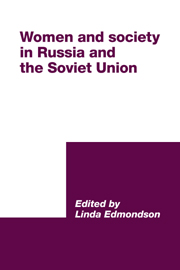Book contents
- Frontmatter
- Contents
- Notes on contributors
- Preface
- Introduction
- 1 ‘Better halves’? Representations of women in Russian urban popular entertainments, 1870-1910
- 2 The Silver Age: highpoint for women?
- 3 Women pharmacists in Russia before World War I: women's emancipation, feminism, professionalization, nationalism and class conflict
- 4 Women's rights, civil rights and the debate over citizenship in the 1905 Revolution
- 5 Laying the foundations of democracy in Russia: E. D. Kuskova's contribution, February–October 1917
- 6 Mariia L. Bochkareva and the Russian amazons of 1917
- 7 Russian women writers: an overview. Post-revolutionary dispersion and adjustment
- 8 Victim or villain? Prostitution in post-revolutionary Russia
- 9 Young women and perestroika
- 10 Glasnost and the woman question
- Index
4 - Women's rights, civil rights and the debate over citizenship in the 1905 Revolution
Published online by Cambridge University Press: 22 October 2009
- Frontmatter
- Contents
- Notes on contributors
- Preface
- Introduction
- 1 ‘Better halves’? Representations of women in Russian urban popular entertainments, 1870-1910
- 2 The Silver Age: highpoint for women?
- 3 Women pharmacists in Russia before World War I: women's emancipation, feminism, professionalization, nationalism and class conflict
- 4 Women's rights, civil rights and the debate over citizenship in the 1905 Revolution
- 5 Laying the foundations of democracy in Russia: E. D. Kuskova's contribution, February–October 1917
- 6 Mariia L. Bochkareva and the Russian amazons of 1917
- 7 Russian women writers: an overview. Post-revolutionary dispersion and adjustment
- 8 Victim or villain? Prostitution in post-revolutionary Russia
- 9 Young women and perestroika
- 10 Glasnost and the woman question
- Index
Summary
One of the most startling features of the 1905 Revolution in Russia was the sudden entrance into the political arena of groups in society which had previously remained well outside it. Whereas the adoption of politics by some groups was seen as a fairly logical, even obligatory, development in a time of national crisis (the ‘reluctant’ Academic Union is a case in point) the politicization of other groups was unexpected and disconcerting. Two prime examples of the latter are peasants and women, both of which categories were commonly regarded as either pre-political or apolitical. The entry of these groups into politics was not universally welcomed, even in opposition circles, and their claims for political rights met very similar objections concerning their supposed ‘immaturity’. The fact that the demand for women's rights (though articulated in the main by educated middle-class women) was made on behalf of working-class and peasant women as well, served only to strengthen the opposition to it. As peasant women were the least literate of all social groups except nomadic tribes, it was easy to point to their assumed ignorance and their notoriously oppressed status within peasant society as reasons for not enfranchising them.
In radical circles the principle of women's suffrage caused few problems. It was written into the programmes of both the social democrats and the socialist revolutionaries and each party prided itself on its commitment to complete equality of all citizens, including unconditional universal suffrage.
- Type
- Chapter
- Information
- Women and Society in Russia and the Soviet Union , pp. 77 - 100Publisher: Cambridge University PressPrint publication year: 1992
- 2
- Cited by

